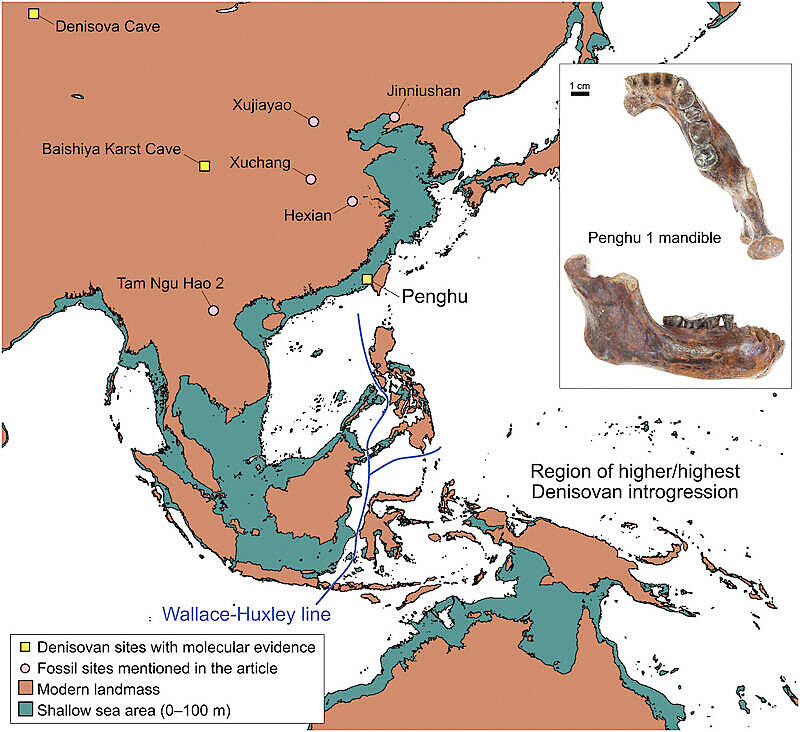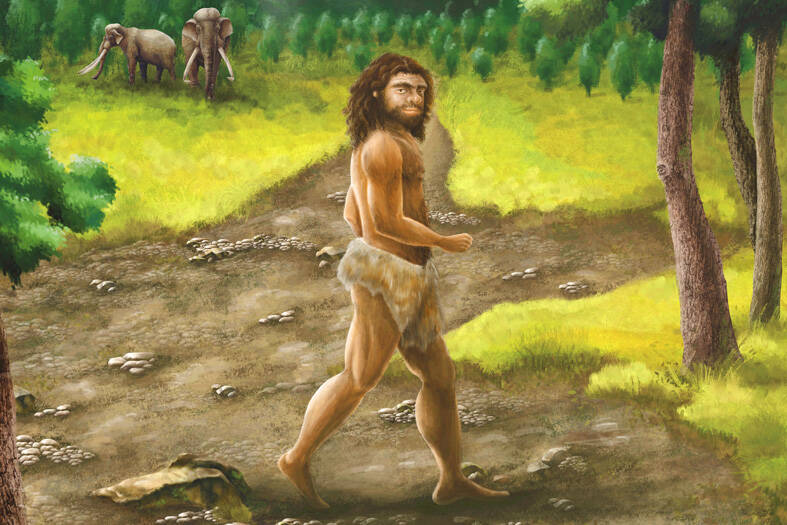Scientists have gained more insight into an extinct species of archaic humans after confirmation that the oldest human fossil in Taiwan is the remains of a Denisovan.
Analysis of proteins extracted from a hominin mandible found in the Penghu Channel in 2015 dated to 10,000 to 70,000 years ago or 130,000 to 190,000 years ago showed that the bone belonged to a male Denisovan, said a study — titled “A male Denisovan mandible from Pleistocene Taiwan” — published in the international journal Science on Thursday.
The lower jawbone, from an individual named Penghu 1, is the first piece of fossil evidence that Denisovans were as widespread as genetic evidence had showed, the authors said.

Photo: Screen grab from the Science Web site
Genomic evidence suggested that the species ranged from eastern Asia and possibly into Oceania, but the only fossils had been found in Tibet and the Altai mountains in southern Siberia, the study said.
Penghu 1 shows that they ranged as far as the genetic evidence indicated, including to warm and humid regions, contributing author National Taiwan University Department of Life Sciences professor Tsai Cheng-hsiu (蔡政修) said.
The fossil also showed the distinct dentognathic traits that markedly distinguish Denisovans from their sister group, Neanderthals, Tsai said.

Photo: Cheng-Han Sun, AP
Follow-up research will focus on how Denisovans arrived in Taiwan, how they lived and whether they left Taiwan, he said.
However, while ancient protein was extracted from the bone, no DNA was found, greatly limiting the scope of analyses and the formation of hypotheses, he added.
That does not detract from the importance of the first-time discovery of Denisovans in Taiwan, Tsai said.
Contributing author Chang Chun-hsiang (張鈞翔) of the National Museum of Natural Science’s Center of Science said that finding Penghu 1 shows that Denisovans were able to adapt to different environments.
Ko Wen-ya (可文亞), an associate professor in National Yang Ming Chiao Tung University’s Department of Life Sciences and Institute of Genome Sciences, said that the findings might affect how Taiwanese identify themselves, adding that the study’s conclusions locate Taiwan within the map of human evolution.
Tracing ancestral roots can help establish a deeper liaison between culture and biological heritage, Ko said.
Further research could explore whether groups in areas of Denisovan activity share similar genetic makeups, or if there are other species that are closely related to Denisovans, he added.
The study said the skeletal remains of Penghu 1 and other items were collected through dredging activities associated with commercial fishing from the sea bottom 25km off the western shore of Taiwan, “which was part of the Asian mainland during episodes of low sea levels during the Pleistocene.”

STAY AWAY: An official said people should avoid disturbing snakes, as most do not actively attack humans, but would react defensively if threatened Taitung County authorities yesterday urged the public to stay vigilant and avoid disturbing snakes in the wild, following five reported snakebite cases in the county so far this year. Taitung County Fire Department secretary Lin Chien-cheng (林建誠) said two of the cases were in Donghe Township (東河) and involved the Taiwan habus, one person was bit by a Chinese pit viper near the South Link Railway and the remaining two were caused by unidentified snakes. He advised residents near fields to be cautious of snakes hiding in shady indoor areas, especially when entering or leaving their homes at night. In case of a

A magnitude 6.4 earthquake struck off the coast of Hualien County in eastern Taiwan at 7pm yesterday, the Central Weather Administration (CWA) said. The epicenter of the temblor was at sea, about 69.9km south of Hualien County Hall, at a depth of 30.9km, it said. There were no immediate reports of damage resulting from the quake. The earthquake’s intensity, which gauges the actual effect of a temblor, was highest in Taitung County’s Changbin Township (長濱), where it measured 5 on Taiwan’s seven-tier intensity scale. The quake also measured an intensity of 4 in Hualien, Nantou, Chiayi, Yunlin, Changhua and Miaoli counties, as well as

Credit departments of farmers’ and fishers’ associations blocked a total of more than NT$180 million (US$6.01 million) from being lost to scams last year, National Police Agency (NPA) data showed. The Agricultural Finance Agency (AFA) said last week that staff of farmers’ and fishers’ associations’ credit departments are required to implement fraud prevention measures when they serve clients at the counter. They would ask clients about personal financial management activities whenever they suspect there might be a fraud situation, and would immediately report the incident to local authorities, which would send police officers to the site to help, it said. NPA data showed

ENERGY RESILIENCE: Although Alaska is open for investments, Taiwan is sourcing its gas from the Middle East, and the sea routes carry risks, Ho Cheng-hui said US government officials’ high-profile reception of a Taiwanese representative at the Alaska Sustainable Energy Conference indicated the emergence of an Indo-Pacific energy resilience alliance, an academic said. Presidential Office Secretary-General Pan Men-an (潘孟安) attended the conference in Alaska on Thursday last week at the invitation of the US government. Pan visited oil and gas facilities with senior US officials, including US Secretary of the Interior Doug Burgum, US Secretary of Energy Chris Wright, Alaska Governor Mike Dunleavy and US Senator Daniel Sullivan. Pan attending the conference on behalf of President William Lai (賴清德) shows a significant elevation in diplomatic representation,